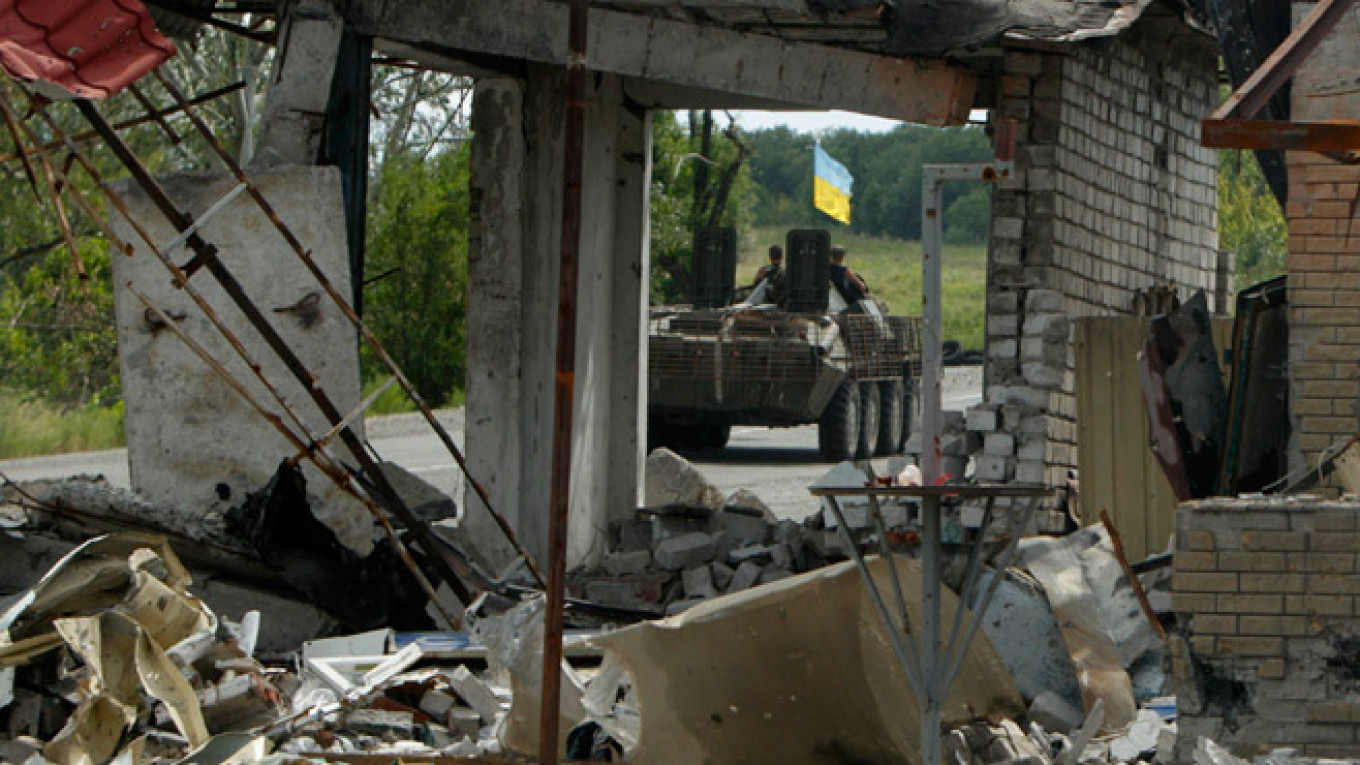"Of course, there's not going to be a war. But there will be such a struggle for peace that it will leave nothing but rubble." This Soviet-era quip comes to mind when observing Russia's feverish calls for peacekeeping actions in Ukraine in recent days.
Last week, the UN Security Council held an emergency meeting in New York at Russia's request. There, Russian representative Vitaly Churkin spared no effort in describing the humanitarian catastrophe in southeastern Ukraine.
Besides the nearly 1,500 deaths, several hundred thousand refugees including children and the elderly have been left to the mercy of fate. This requires immediate intervention from the global community, Churkin said. Kiev, at least according to Moscow, has failed to provide safe passage for non-combatants, and so Russia should step in to lead convoys of humanitarian aid for those trapped in the conflict zone.
Meanwhile, Defense Minister Sergei Shoigu recently visited the 15th Motorized Rifle Brigade, a military unit specifically created for peacekeeping operations. He praised the soldiers' training, and noted significantly: "The world has changed drastically. As you know from past incidents, including the experience of this brigade, peacekeeping units can be called upon unexpectedly."
At practically the same time, troubling announcements came out of various Western nations. Polish Prime Minister Donald Tusk said he had information that the risk of direct military intervention by Russia in Ukraine had risen sharply. NATO spokeswoman Oana Lungescu said in an official statement that Russia had amassed about 20,000 troops on its border with Ukraine and could use the pretext of humanitarian aid or a peacekeeping mission to send them into its neighbor's territory.
Kiev, however, has been ignoring this ploy and continuing military actions, regardless of losses among its troops or the deaths of civilians. And although it's highly unlikely that Ukraine will achieve a smooth military victory, the separatists have nothing good to look forward to in the coming weeks.
The likely chaos of the next few weeks could, though, provide the pretext needed for Russia to send in troops under the guise of protecting humanitarian convoys. Military accompaniment for a convoy will force Ukrainian troops into a temporary cease-fire, giving the "militants" a breather.
But who exactly is Moscow trying to fool, calling a Russian invasion "peacekeeping"?
For a military action to be considered peacekeeping, it must meet a minimum of two requirements.
First, both opposing sides must agree to a cease-fire and the arrival of a peacekeeping force. In this situation, an agreement from Kiev can be easily ruled out as impossible.
Second, the peacekeeping operation should have a mandate from an international organization (preferably the UN). Keeping in mind that even close allies like Belarussian leader Alexander Lukashenko disapprove of Russia's Ukraine policy, it seems highly unlikely that Moscow will receive such a mandate even from, say, the CIS.
So the only groups calling a Russian military intrusion a "peacekeeping" operation will be the country's own Foreign Ministry and television anchors. Why go through all this song and dance, then?
If such a plan really does exist, then the only explanation is that all these games are meant to convince the Russian public of the necessity of intervening. Of course, they are ready to give their all for "Our Crimea" and "Novorossia." But surveys show that Russians are emphatically against a military conflict; they don't want an invasion of Ukraine. But perhaps the Kremlin believes that they would support an intervention if it were called "peacekeeping."
Alexander Golts is deputy editor of the online newspaper Yezhednevny Zhurnal.
A Message from The Moscow Times:
Dear readers,
We are facing unprecedented challenges. Russia's Prosecutor General's Office has designated The Moscow Times as an "undesirable" organization, criminalizing our work and putting our staff at risk of prosecution. This follows our earlier unjust labeling as a "foreign agent."
These actions are direct attempts to silence independent journalism in Russia. The authorities claim our work "discredits the decisions of the Russian leadership." We see things differently: we strive to provide accurate, unbiased reporting on Russia.
We, the journalists of The Moscow Times, refuse to be silenced. But to continue our work, we need your help.
Your support, no matter how small, makes a world of difference. If you can, please support us monthly starting from just $2. It's quick to set up, and every contribution makes a significant impact.
By supporting The Moscow Times, you're defending open, independent journalism in the face of repression. Thank you for standing with us.
Remind me later.







